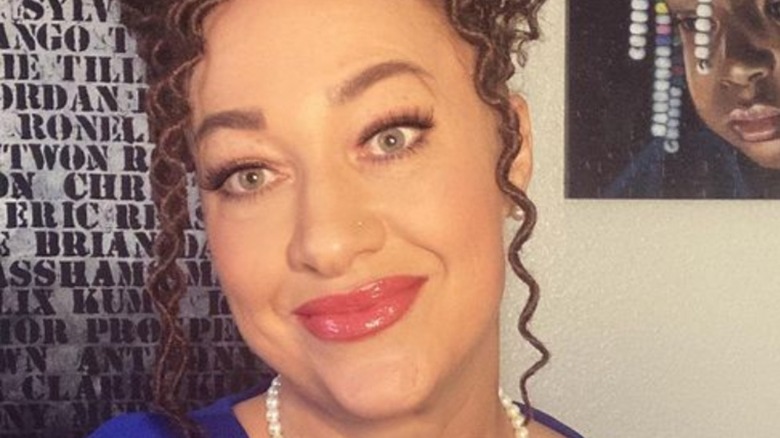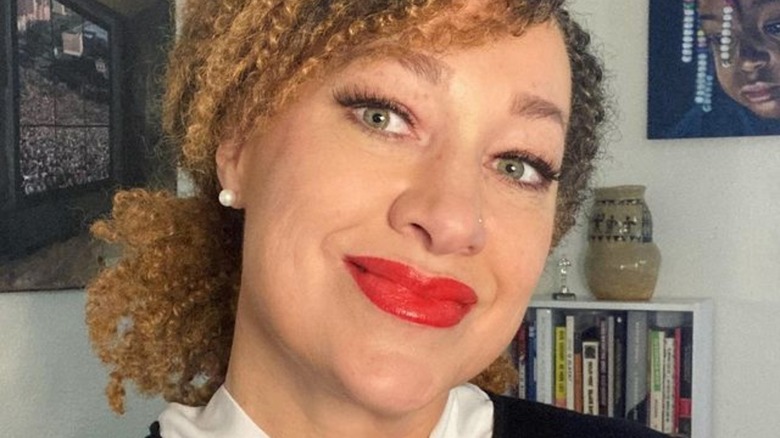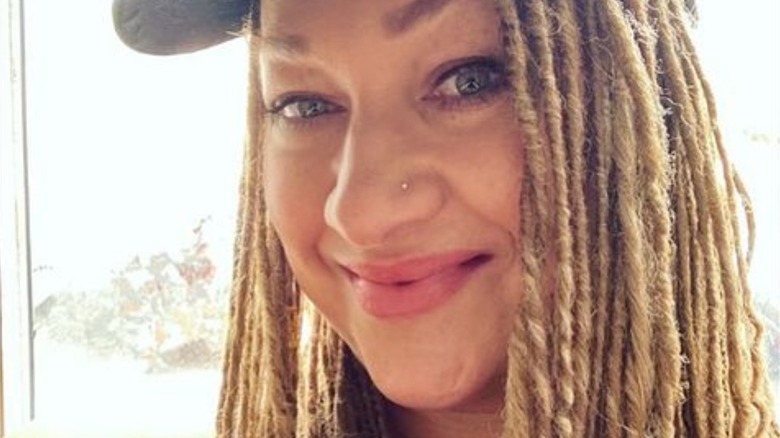The Strange Way Rachel Dolezal Makes Money Now
Rachel Dolezal made headlines back in 2015 as possibly the most famous example of a "race faker," someone who pretends to be an ethnicity that they are not. In this case, Dolezal attempted to pass herself off as African American when in reality, she is a white woman. The world became aware of her deception during an interview on June 11, 2015, when Dolezal was asked straight up if she was African American, as reported by The Guardian. Dolezal's subsequent confusion with the question and stuttered answer tipped off viewers that she wasn't who she had claimed to be.
The Montana native faced a swift and harsh downfall following her parents' confirmation that her race was in fact white. She was quickly forced out of her role as president of the National Association for the Advancement of Colored People (NAACP) in Spokane, Washington, where she made her home. Her contract teaching African studies at Eastern Washington University was also not renewed.
Despite the public ostracism that Dolezal has faced, she still claims to identify as a Black woman and lives her life as such, keeping her skin perpetually tanned and doing up her hair in traditional African American hairstyles. In an interview with Vanity Fair, the mother-of-two stated that her earliest memories are of "connection with the Black experience," and that has never left her. Since the whole ordeal went down, Dolezal has had difficulty finding a job and has resorted to unconventional ways of paying the bills. Keep scrolling to find out what she's doing now.
Rachel Dolezal makes her money through unconventional side hustles
Rachel Dolezal told Vanity Fair that after the truth about her race became public, she lost a lot, including friends, jobs, and money. Six years later, it has still been incredibly difficult for Dolezal to find a job. She told Tamron Hall during an interview on "The Tamron Hall Show" in February that she continuously gets turned down for jobs before even getting the chance to be interviewed. "I started with applying for all of the things I was qualified for... I even applied to jobs that didn't even require degrees," Dolezal revealed. Among the jobs she applied for were a hotel maid and a casino worker. She has had to resort to side hustles to make ends meet. Dolezal explains, "...Having to create my own job and find my own ways to provide for my children through braiding hair, through grant writing to bring funds into marginalized communities and Black-owned businesses and nonprofits, through painting..."
Most recently, Dolezal made an OnlyFans account to try to bring in more money, which she revealed via her Instagram page in mid-August. Dolezal wrote that her account was approved and content would launch on September 1. She'll be offering plenty of unique content, including "Monday Motivation = Gym/Fitness/Squats N Other Stuff" and "Friday Unwind: I bring the Art, you bring the wine/drinks. Watch me create & discuss my art." Her Instagram followers left comments expressing their excitement about her new endeavor.
Why Rachel Dolezal has stirred up so much controversy
Rachel Dolezal, who has gone so far as to legally change her name to Nkechi Amare Diallo (a name with roots in different African cultures, per NPR), suffered a popularity plunge after it came out that she is white. Dolezal's deception caused outrage among both white and Black communities, with people calling her "mentally ill" and likening her life to "blackface," as reported by The Guardian. When speaking with Loni Love in an episode of "The Real" in 2015, Dolezal made the mistake of quoting activist Dick Gregory in an attempt to defend her choices. "White isn't a race, it's a state of mind," she said. Love had a blunt response: "No, let me tell you something. I'm Black. I can't be you, I can't reverse myself. That's the difference."
Love's reaction to Dolezal's comment seems to reflect a general consensus about why Dolezal's attempt to pass as another race is seen as an offensive and privileged appropriation. As Steven W. Thrasher, a columnist for The Guardian, opined, "The reason that her story is so fascinating to me and to the rest of the world is that it exposes in a disquieting way that our race is performance... despite the stark differences in how our races are perceived and privileged... they are all predicated on a myth that the differences are intrinsic and intrinsically perceptible."



